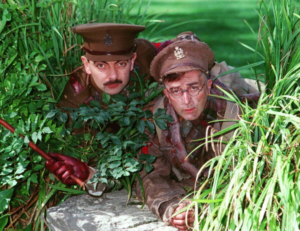A judge in a libel case once warned the jury not to award “Mickey Mouse damages”, plunging them into confusion over whether he meant ridiculously large or ridiculously small. The Government, however, has no such doubts about what counts as a Mickey Mouse university degree, and is talking of cutting academic courses with low intellectual content and a poor retention level which are unlikely to land you up as CEO of British Airways. There will be no more PhDs in astrology or ballroom dancing, no more would-be jugglers, lion tamers, water diviners or kissogram workers in cap and gown on Graduation Day.
The problem is that the Government isn’t going far enough. There are lots of respectable academic subjects which could easily be dumped with no discernible loss to the nation. Take history, for example, which someone once described as a set of events which should never have happened. From the An Shun civil war of 8th-century China, which resulted in some 429 million deaths, to the extermination of native Americans, which outdid Mao Zedong’s massacres by a ratio of two to one, history has been, for the most part, a saga of bloodshed and brutality. Peace and justice have never reigned over any considerable part of the globe for any considerable length of time. What kindness and compassion have flourished have been largely confined to the private or civic sphere. Most men and women have lived lives of hard labour for the benefit of a few.
To set our students loose on this chronicle of hacking and gouging is rash in the extreme. Many of them are pretty fragile already, and opening a history book can only deepen their anxiety. We need bright-eyed, forward-looking citizens, not depressive types overwhelmed by the nightmare of history. As the Victorians knew, there is a well-trodden path from dejection to political disaffection, which is why what we read should cheer us up, rather than cast us down. Most civilisations are the fruit of invasion, occupation or extermination; but, as Edmund Burke points out, they thrive by repressing this original sin and coming gradually to forget it. If we are to succeed at all, then, we must jettison the past. Oblivion is the basis of achievement.
Much the same goes for the study of literature. Before Thomas Hardy came to write in the late 19th century, there was scarcely a novelist in Britain whose work concluded on a downbeat note. Emily Bronte’s Wuthering Heights is one of the few bold exceptions. From Henry Fielding to Jane Austen and Charles Dickens, happy endings are more or less obligatory. Why? Because there has to be somewhere in the world where the virtuous reap their reward and the wicked get their comeuppance, and this place is known as a novel. The more predatory and rapacious society grows, the less you will find such justice outside fiction. The fewer happy endings there are in real life, however, the more obtrusive and implausible they became in fiction, so that the typical end of a 20th-century novel is bleak and irresolute.
“After a while, I left the room and left the hospital and walked back to the hotel in the rain,” reads the final sentence of Ernest Hemingway’s A Farewell to Arms, after the protagonist’s young partner has died before his eyes. So literature, too, is bad for morale. Rather than turning you hopefully towards the practical world, it plunges you morbidly into your own innards. Reading poetry is also bad for your spiritual health. As for plays and novels, there’s something peculiarly pointless about spending years, even a whole lifetime, studying people and events that never existed.
At least history has the edge over literature in that respect. Nobody has ever come up with a watertight definition of literature, which suggests how vacuous the whole project really is. Let’s hope the same isn’t true of aeronautical engineering. Besides, you don’t need to be a university student to read poems, plays and novels. Many people do it anyway, in their spare time. They also enjoy a pint occasionally, but they don’t see the need to take a degree in it.
Geography is palpably a non-subject. I was once a fellow of an Oxford college where there were two geographers, one of whom studied the demography of Asian communities in the Midlands. The other was an expert on sand dunes. What kind of coherent discipline is that? A lot of Americans seem to get on perfectly well without knowing where anything is in the world, except when they need to bomb it, so there’s no reason why we shouldn’t do the same. In any case, maps give away our location to immigrants and terrorists. They also distort reality, showing Russia and China as imposing tracts of land and the UK as a mere smudge. What this belies is the infinite distance between Russian barbarism and British civility.
There is less need for geography now that we’re out of the EU, and the same applies to modern languages. “Why should I travel?” asked a woman who lived on Manhattan’s Upper West Side. “I’m here already.” We British might say the same, being fortunate enough to live in the birthplace of industry, empire, modernity, liberalism and the world’s greatest playwright. It’s true that the British go abroad for the sun, but climate change ought to abolish this custom in the future, as temperatures here climb to Sicilian levels.
One of the few benefits of climate catastrophe is that we’ll be able to stay at home. There will be no need for continental holidays, and no possibility of them either. It’s true that we’ll die of heat at home instead, but better to pass away in the bosom of your own folk than among people who have never heard of Katie Price.
Theology, meanwhile is a subject without an object. It’s on a level with Ufology and Loch Ness Monster studies. Classics involves highly unpleasant people like Nero and Caligula and at least one former prime minister. Sociology is just a way of dressing up Left-wing ideology in spuriously scientific garb. Politics is a career, not a seminar for eggheads. As for art, you don’t need to know about Raphael and Rembrandt in order to churn out marketable stuff. You don’t even need to have heard of them. Philosophy is a subject for pedants who think they can save people from suicide by pointing out that the grammar of “nothing matters” differs from that of “nothing chatters”. Those bits of science with practical applications are worth preserving, but not those bits that don’t, such as inquiries into quarks, black holes and the lower bowel of the aardvark.
Medicine has its uses, but one wonders how much of it would really be necessary if we overhauled our attitude to life. A little more pride in ourselves, a mite less grousing and negativity, and watch those tumours disappear. Some people make a case for the importance of law; but law is basically a matter of right and wrong actions, and you don’t need to pore over a bunch of mouldy statutes and precedents to know about that. You should have learnt it already from the moral values instilled in you by your parents. What matters is the family hearth, not the lecture hall.
The fact is that all we really need are business schools. Apart from the odd laboratory here and there, we could abolish universities altogether and save ourselves a stupendous amount of money. It’s true that this might leave hordes of young people with time on their hands, but this was never a problem in the days of National Service. In any case, universities are flagrantly self-contradictory institutions. Having being dragged out of the Middle Ages and forced to become efficient, they now look more like Tesco’s head office rather than ivory towers.
They have senior management, formerly known as “professors”, plenty of consumers (once called “students”), an eminently saleable commodity (so-called “knowledge”) and will soon be pricing ideas according to their importance, allowing consumers to decide which ones they can afford. If a course on metaphysics isn’t pulling in the punters, they can launch one on Gambling for Beginners instead. At least one British university discourages academics from keeping books in their offices, given that paper in an electronic age is ridiculously passé. They might as well have parchment and quills.
It’s all very admirable as far as it goes — yet, absurdly, these places don’t have shareholders, and haven’t been able to escape the chill clutches of the state. It’s true that there are one or two private universities around the place, but nobody knows where they are. They should stop hiding away and have the courage of their convictions. Allow the state to have a hand in education and before you know where you are, Keir Starmer will be deciding on the most plausible interpretation of Hamlet, and woe to those who lecture out of line!
Universities have had their day. Let’s stop pretending that some academic courses are garbage while others are worthwhile. Just cut the whole bloody lot of them.
Disclaimer
Some of the posts we share are controversial and we do not necessarily agree with them in the whole extend. Sometimes we agree with the content or part of it but we do not agree with the narration or language. Nevertheless we find them somehow interesting, valuable and/or informative or we share them, because we strongly believe in freedom of speech, free press and journalism. We strongly encourage you to have a critical approach to all the content, do your own research and analysis to build your own opinion.
We would be glad to have your feedback.
Source: UnHerd Read the original article here: https://unherd.com/



